Knowing if an infant was born on time or prematurely can make all the difference in deciding what medical care the baby needs.
In the United States, obstetricians can accurately predict how many weeks a mother has carried her baby, thanks to prenatal care and early ultrasounds.
That's not the case in developing countries where a scarcity of technology and adequate medical care leave little more than birth weight to determine a newborn's gestational age.
 UI researchers have found they can estimate an infants's gestation age through a metabolic profile derived from routine newborn screenings. Credit: University of Iowa
UI researchers have found they can estimate an infants's gestation age through a metabolic profile derived from routine newborn screenings. Credit: University of Iowa
But now, researchers at the University of Iowa have found that a metabolic profile derived from routine newborn screenings is a reliable method of estimating an infant's gestational age. All it takes is a drop of blood.
"It's important to know whether a baby is small because it is simply small in size but born on time or is small because it was born early," says Kelli Ryckman, assistant professor of epidemiology in the UI College of Public Health and lead author of the study. "It helps determine how doctors should move forward with that baby and what kinds of health issues they should watch for."
The study, "Predicting gestational age using neonatal metabolic markers," was published recently in the American Journal of Obstetrics and Gynecology. Other UI researchers involved with the study are Stanton Berberich, program manager at the State Hygienic Laboratory, and John Dagle, associate professor at the Department of Pediatrics for UI Health Care.
Premature--also known as preterm--birth refers to when a baby is born before 37 weeks of pregnancy. Important growth and development occur throughout pregnancy--especially in the final months and weeks.
According to the World Health Organization, about 15 million babies are born preterm each year; that is more than 1 in 10 babies worldwide. Some 60 percent of them are born in sub-Saharan Africa and South Asia.
Preterm birth is now the leading cause of death in children under five worldwide. Nearly 1 million children die each year from complications related to preterm birth. Many survivors face a lifetime of challenges, including learning disabilities and visual and hearing problems.
The study analyzed five years of data--about 300,000 records--from the Iowa neonatal newborn-screening program. The screening is a routine part of care for every baby born in the U.S. and tests for mostly rare conditions that, if caught early, can be treated to reduce the likely damaging health effects to the child.
The researchers hypothesized that metabolic markers measured during the newborn screening could build a first-ever metabolic gestational-dating algorithm that could be used at the time of birth when there is no early ultrasound.
Their theory worked--but they weren't alone in their findings.
Ryckman's manuscript was published by AJOG in tandem with papers from the University of California, San Francisco and the University of Ottawa whose similar gestational age studies independently reached the same conclusion as the one conducted by UI researchers.
The trio of studies was funded by the Gates Grand Challenges, an initiative of the Bill and Melinda Gates Foundation. George Wehby, associate professor in the UI Department of Health Management and Policy at the College of Public Health, is the principal investigator for the UI Grand Challenges Explorations' phase one grant. Ryckman also received funding for this study from the National Institutes of Health.
"All of our groups are excited by these findings, which we feel will have particular relevance in low-resource settings where women enter prenatal care late or not at all," Ryckman says.
Ryckman is now joining researchers from the University of California, San Francisco; the University of California, San Diego; Harvard University; the University of Toronto; the University of Malawi; and Makerere University for a metabolic-testing trial on 800 newborns in Uganda and Malawi. The researchers will also apply a similar model to samples of the mothers' blood to see if they can determine which mothers may deliver early.
"We want to see if we can get at another aspect of this situation, which is targeting women who are at high risk of delivering early," Ryckman says.
The two-year study is being funded by $950,000 from the Gates Foundation and the University of California, San Francisco Preterm Birth Initiative.
Inequalities in survival rates for preterm babies around the world are stark, according to the World Health Organization. In low-income settings, half of babies born at or earlier than 32 weeks die because of a lack of feasible, cost-effective care, such as warmth, breastfeeding support, and basic care for infections and breathing difficulties. In high-income countries, almost all of these babies survive.
Ryckman says researchers hope their metabolic gestational-dating algorithm can be used in developing countries to actively examine the rates of preterm births and then target at-risk areas with interventions and prevention programs. Current measures, such as birth weight, are very poor surrogates for gestational age, and the researchers hope their metabolic gestational-dating algorithm can provide a more accurate estimate of preterm birth in the low-resource areas that need it most.
source: University of Iowa